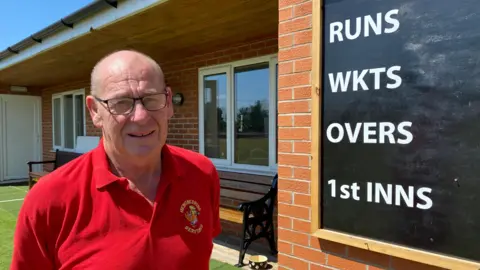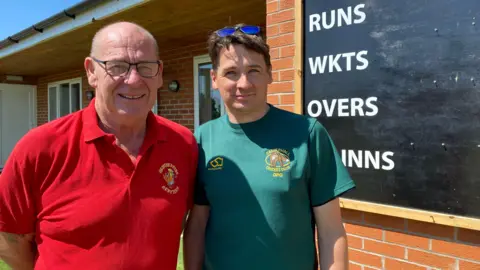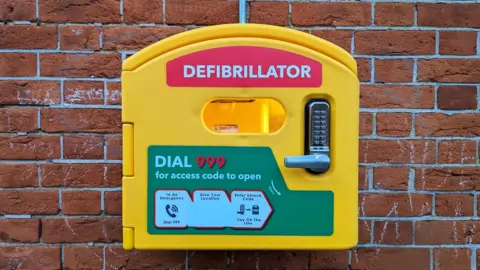'I died for 10 minutes - this is my second innings'
 BBC
BBCA man who had a cardiac arrest while playing cricket has described being saved by a defibrillator as his "second innings".
Simon Parker, 59, was batting for Calverhall Cricket Club in Shropshire when he collapsed in June, and he died for more than 10 minutes. His son administered CPR and an off-duty firefighter used the club's defibrillator.
It was the first time it had been used since it was installed by former club cricketer, Paul Carter, who they had a minute's silence for just before the match started.
"I remember starting to walk down the wicket, going dizzy, and that's about as much as I remember. Then I remember them putting me in the helicopter," he said.
Mr Carter had campaigned tirelessly for a defibrillator to be kept on site before he died.
"It's a poignant, divine... moment, really, the fact it was that day that it got used," said firefighter Matt Wilson.

"I remember once in the middle of it sort of waking up; they turned me on my side and I was sick, but other than that, I don't really relate to what actually happened," said Mr Parker.
He said his son, Alex, who stepped in to do CPR, had been his "rock" for years.
"You wouldn't wish that on anybody, really. He's very strong-willed, and of course he is a very strong lad."
"I suppose he wouldn't have cared if he'd hurt me or not; he was determined, and he did what he needed to do.
"I've still got the bruises to show for it."
Oliver Griffiths, first team captain, was there. "Watching a son trying to save his dad's life was quite emotional," he said.
"It still affects me a little bit now, just that image of Alex."
 Getty Images
Getty Images"These defibs, they need to be everywhere, don't they?"
"They're fantastic; they save people's lives, and that's it.
"You don't really think you're ever going to use one yourself."
He told the BBC that he believed all sports clubs should have one and that more training was needed to teach people how to use them.
In the wake of the incident, the opposition side, Wellington, held free resuscitation training sessions for CPR and defibrillator use last Friday and on Monday.
Mr Parker said the event had been hard to come to terms with, despite not identifying with much of the experience.
"It's just so unreal for something like this to happen, and then you wake up the next morning."
"It has been hard, actually, going to sleep at night and then wondering whether you are going to get up the next morning."
The experience has changed much of his life - he needs to take things slowly and is on a series of medications.
"I'm on 14 or 15 tablets every day," he said.
'It's another chance at life'
Looking ahead, he hopes to eventually play again.
"I think the biggest job will be standing out there, being able to have the guts after what happened to go out there, because that's the bit I remember," he said.
"That is going to be very difficult.
"I don't think the fielding is going to be the problem; I think it's just the actual standing in the middle and batting."
He added that it had made him reflect on his life.
"Like they say, you only get one chance in this world, but if you get two - make the best of it."
"Another chance, isn't it? It's that dropped catch where you keep going."
Follow BBC Shropshire on BBC Sounds, Facebook, X and Instagram.
